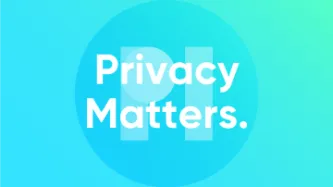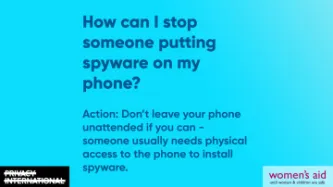Advanced Search
Content Type: News & Analysis
Layla looks at her calendar on her phone. She’s in charge of planning her book club’s monthly meeting. After thinking for a second, she summons her AI assistant: “Hey Assistant, can you book me a table at that tapas restaurant I read about last week, and invite everyone from the book club? The restaurant should be in my browsing history. Let me know if the journey is more than 1-hour for anyone”. As the assistant compiles a response, she wonders if anyone else will hear this.Technology has made…
Content Type: Press release
FOR IMMEDIATE RELEASELONDON - 7 April 2025The Investigatory Powers Tribunal (IPT) has confirmed it will hear Privacy International, Liberty and two individuals’ challenge to the legality of the Home Secretary’s decision to use her powers to secretly force Apple to allegedly give the UK Government access to users’ secured data stored on iCloud. The challenge will also cover the legality of the Government issuing these types of notices at all. Privacy International and Liberty,…
Content Type: Long Read
On 13 March 2025, we filed a complaint against the UK government challenging their use of dangerous, disproportionate and intrusive surveillance powers to undermine the privacy and security of people all over the world. Here, we answer some key questions about the case and the recent events that led to this development.Note: This post was last updated on 13 March 2025.What’s the fuss about?A month ago, it was reported that the UK government demanded Apple Inc – maker of the iPhone, iPads, Macs…
Content Type: Advocacy
We believe the Government's position of refusing to confirm or deny the existence of the Technical Capability Notice or acknowledge Apple's appeal is untenable and violates principles of transparency and accountability.
Content Type: Explainer
Imagine this: a power that secretly orders someone anywhere in the world to abide and the receiver can’t tell anyone, can’t even publicly say if they disagree, and can’t really question the power in open court because the secret order is, well, secret. Oh and that power affects billions of people’s security and their data. And despite being affected, we too can’t question the secret order.In this piece we will outline what’s ridiculous, the absurd, and the downright disturbing about what’s…
Content Type: Report
First published in 2017, PI’s Guide to International Law and Surveillance is an attempt to collate relevant excerpts from these judgments and reports into a single principled guide that will be regularly updated. This is the fourth edition of the Guide. It has been updated it to reflect the most relevant legal developments until March 2024.The Guide aspires to be a handy reference tool for anyone engaging in campaigning, advocacy, and scholarly research, on these issues. The fourth…
Content Type: Advocacy
BackgroundThe Snowden revelations and subsequent litigation have repeatedly identified unlawful state surveillance by UK agencies. In response, the UK Parliament passed the highly controversial Investigatory Powers Act 2016 (IPA), which authorised massive, suspicionless surveillance on a scale never seen before, with insufficient safeguards or independent oversight.Privacy International led legal challenges to this mass surveillance regime both before and after the Act became law. The Act…
Content Type: Advocacy
We are responding to the UK Government's consultation to expand its powers around Technical Capabilities Notices and National Security Notices.
Background
Following Edward Snowden's revelations about the illegal and expansive secret powers of the US and UK intelligence agencies, the UK Government took the opportunity to, rather than reflect on what powers are proportionate in the modern era, to expand its arsenal of surveillance powers.
One of the powers it added was the ability to issue…
Content Type: Advocacy
Privacy International welcomes the aim of the Cyber Resilience Act to bolster cybersecurity rules to ensure more secure hardware and software products. Nevertheless, we note that the proposal put forward by the European Commission contains certain shortcomings which could both hamper innovation and harm consumers who are increasingly relying on digital products and services.It is essential these shortcomings, detailed below, are effectively addressed by the EU co-legislators through the…
Content Type: Examples
Just as China uses technology system called "Integrated Joint Operations Platform" to control and surveil the persecuted population of Uighurs while restricting their movement and branding dissent as "terrorism", the Israeli military is using facial recognition and a massive database of personal information to control millions of Palestinians in the occupied West Bank. In November 2021, NSO Group's Pegasus spyware was found on the phones of six Palestinian human rights activists, three of whom…
Content Type: Examples
The Israeli minister of public security has joined police in denying claims in an article in Calcalist that the country's police force have used NSO Group's Pegasus software to spy on the phones of people who led protests against former premier Benjamin Netanyahu. Calcalist reported that the surveillance was carried out without court supervision or oversight of how the data was used. The daily Haaretz newspaper also reported that it had seen a 2013 invoice in which NSO billed police @@2.7…
Content Type: Advocacy
Our environment is increasingly populated by devices connected to the Internet, from computers and mobile phones to sound systems and TVs to fridges, kettles, toys, or domestic alarms. There has been research into the negative safety and privacy impacts of inadequate security provided by the software in such devices (such as the creation of large scale botnets). This is also the case with outdated security, a risk enabled by software support periods that are shorter than a product’s usable life…
Content Type: Press release
Amnesty International, Privacy International and The Centre for Research on Multinational Corporations (SOMO) have published a report uncovering NSO Group’s entire corporate structure, tracking the global money trail of both public and private investment into the lucrative spyware company.
Amnesty International and other rights groups have documented dozens of cases of NSO Group’s products being used by repressive governments across the world to put activists, journalists, and opposition…
Content Type: Report
In this briefing, Amnesty International, PI and The Centre for Research on Multinational Corporations (SOMO) discuss the corporate structure of NSO group, one of the surveillance industry's well-known participants. The lack of transparency around NSO Group’s corporate structure and the lack of information about the relevant jurisdictions within which it operates are significant barriers in seeking prevention of, and accountability for, human rights violations reportedly linked to NSO Group’s…
Content Type: Explainer
What is hacking?
Hacking refers to finding vulnerabilities in electronic systems, either to report and repair them, or to exploit them.
Hacking can help to identify and fix security flaws in devices, networks and services that millions of people may use. But it can also be used to access our devices, collect information about us, and manipulate us and our devices in other ways.
Hacking comprises a range of ever-evolving techniques. It can be done remotely, but it can also include physical…
Content Type: Long Read
On 8 January 2021, the UK High Court issued a judgment in the case of Privacy International v. Investigatory Powers Tribunal. The Secretary of State for Foreign and Commonwealth Affairs and Government Communication Headquarters (GCHQ) appeared as interested parties to the case.
After our initial reaction, below we answer some of the main questions relating to the case.
NOTE: This post reflects our initial reaction to the judgment and may be updated.
What’s the ruling all about?
In…
Content Type: Frequently Asked Questions
On 8 January 2021, the UK High Court issued a judgment in the case of Privacy International v. Investigatory Powers Tribunal. The Secretary of State for Foreign and Commonwealth Affairs and Government Communication Headquarters (GCHQ) appeared as interested parties to the case.
After our initial reaction, below we answer some of the main questions relating to the case.
NOTE: This post reflects our initial reaction to the judgment and may be updated.
Content Type: News & Analysis
Samsung has announced that the company will commit to providing major software updates for three generations of the Android operating system, but only for its flagship models: the S10, S20, Note 10 and Note 20.
From our reading of the available information, this means that these models will be getting support, including the latest operating system, features and security updates, for three years (as new Android operating systems are released every year).
While this is welcome news, it only…
Content Type: Case Study
Privacy matters. It matters when you’re walking the streets of your home town and when you’re fleeing your home in search of safety. It matters if you’re at a protest or if you’re in bed.
Our wellbeing in each of these instances depends on the protection of our privacy. No situation can be fully understood in isolation.
Unjustifiable intrusions on our privacy become a weapon to eradicate communities and prey upon refugees and asylum seekers, push people away from protests in fear of…
Content Type: Case Study
Numerous sexist, mysoginistic, homophobic and racist practices are flourishing online, in ways that are harder for national authorities to stop than when abuse takes place offline. One of these practices is ‘revenge pornography’, which involves online distribution of private sexual images without the consent of the person depicted.
One victim of image based sexual abuse (more commonly known as revenge porn): Chrissy Chambers. Chrissy was 18 years old when her boyfriend convinced her to spend…
Content Type: Case Study
You have the right to decent standards and dignity at work, and the right to join a union to protect yourself and your rights. That might come as a shock to Amazon - who have been using Covid-19 as a reason to undermine those rights.
Chris Smalls, an organiser and now former Amazon warehouse assistant manager, led a walkout at a New York City facility and within days he’d been fired under a dubious pretext.
The walkout was to ensure workers’ safety - they were asking for the warehouse to be…
Content Type: Examples
Academics have disclosed today a new vulnerability in the Bluetooth wireless protocol, broadly used to interconnect modern devices, such as smartphones, tablets, laptops, and smart IoT devices.
The vulnerability, codenamed BIAS (Bluetooth Impersonation AttackS), impacts the classic version of the Bluetooth protocol, also known as Basic Rate / Enhanced Data Rate, Bluetooth BR/EDR, or just Bluetooth Classic.
The BIAS attack
The BIAS security flaw resides in how devices handle the link key,…
Content Type: News & Analysis
A few weeks ago, its name would probably have been unknown to you. Amidst the covid-19 crisis and the lockdown it caused, Zoom has suddenly become the go-to tool for video chat and conference calling, whether it’s a business meeting, a drink with friends, or a much needed moment with your family. This intense rise in use has been financially good to the company, but it also came with a hefty toll on its image and serious scrutiny on its privacy and security practices.
While Zoom already had a…
Content Type: Case Study
Over the past decade targeted advertisement has become exponentially more invasive. To enable targeted advertisement, massive amounts of data about individuals are collected, shared and processed often without their knowledge or consent. This information about us is then used to profile us and micro-target us to sell us products or influence our views.
This is a significant intrusion to our privacy inevitably affects our perogative not to reveal our thoughts; not to have our thoughts…
Content Type: Case Study
Since August 2017 742,000 Rohingya people - including children - fled across the Myanmar border to Bangladesh, escaping what the UN labelled a “textbook example of ethnic cleansing”.
In this context of ethnoreligious violence, Facebook has been a central figure. For many in Myanmar “Facebook is the internet” - as of January 2018 around 19 million people in Myanmar were facebook users, this is roughly equal to the number of internet users in the country.
A New York Times report revealed that…
Content Type: Examples
An engineering and computer science professor and his team from The Ohio State University discovered a design flaw in low-powered Bluetooth devices that leaves them susceptible to hacking.
Zhiqiang Lin, associate professor of computer science and engineering at the university, found the commonly used Bluetooth Low Energy devices, such as fitness trackers and smart speakers, are vulnerable when they communicate with their associated apps on the owner’s mobile phone.
"There is a fundamental…
Content Type: Case Study
The right to privacy is crucial to protect a couple’s equal rights within marriage.
The recent rise of spyware as an “off-the-shelf” product that anyone can purchase has been extremely worrying, as installing spyware on someone else’s phone means getting access to their contacts, their messages, their google searches, their location and more - all without them knowing.
Spyware is, increasingly, becoming another way for abusive spouses to control and monitor their partners. Nearly a third of…
Content Type: Explainer
In a scramble to track, and thereby stem the flow of, new cases of Covid-19, Governments around the world are rushing to track the locations of their populace. One way to do this is to write a smartphone app which uses Bluetooth technology, and encourage (or mandate) that individuals download and use the app. We have seen such examples in Singapore and emerging plans in the UK.
Apps that use Bluetooth are just one way to track location. There are several different technologies in a smartphone…
Content Type: Case Study
In Peru, you get asked for your fingerprint and your ID constantly - when you’re getting a new phone line installed or depositing money in your bank account – and every Peruvian person has an ID card, and is included in the National Registry of Identity – a huge database designed to prove that everyone is who they say they are. After all, you can change your name, but not your fingerprint.
However, in 2019 the National Police of Peru uncovered a criminal operation that was doing just that:…
Content Type: Case Study
There are 29.4 million refugees and asylum seekers across the globe today. These are people who have fled their countries due to conflict, violence or persecution seeking protection in safer environments.
People have protected those in need fleeing from dire situations since antiquity. However, over recent years, European countries have become increasingly hostile towards refugees - treating them as criminals instead of people in need.
In 2017, German authorities passed a…
























